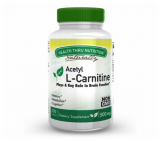
Does your body have enough carnitine?
Carnitine palmitoyltransferase II (CPT-II) is an enzyme located in the inner membrane of the mitochondria and a vital component of the carnitine transport system. A CPT-II deficiency is one of the most common mitochondrial beta-oxidation defects and is a result of a genetic mutation. When the body is deficient of CPT-II, it is unable to metabolize long chain fatty acids and convert it to energy in the form of ATP.
There are three main types of CPT-II deficiencies: a lethal neonatal form, a severe infantile hepatocardiomuscular form, and a myopathic form. The neonatal form is rapidly fatal and presents itself shortly after birth. This form can be characterized by respiratory distress, seizures, altered mental status, hepatomegaly, cardiomegaly, cardiac arrhythmia, and, in many cases, dysmorphic features, renal dysgenesis, and neuronal migration defects. The infantile form usually presents between 6 and 24 months of age causing loss of consciousness and seizures, liver failure, and transient hepatomegaly.
The myopathic form of CPT-II deficiency is most frequently found in adolescents or young adults. Compared to infants, the adult onset CPT-II deficiency is less severe because infants rely on fats as their primary source of caloric intake, while adults have a greater variety of foods that can contribute to his or her total caloric intake.
Given its importance in fatty acid oxidation and energy metabolism, l-carnitine has been investigated as ergogenic aid for enhancing exercise capacity and acute physical performance. An increase in serum and muscle L-carnitine is suggested to enhance blood flow and oxygen supply to muscle tissue. Furthermore, L-carnitine supplementation can have a positive impact on the recovery process after exercising by alleviating muscle injury and reducing markers of cellular damage and free radical formation accompanied by attenuation of muscle soreness. Research conducted in older populations showed that l-carnitine intake can even lead to increased muscle mass, accompanied by a decrease in body weight and reduced physical and mental fatigue.
Due to the complexity of treating a CPT-II deficiency, it is important to point out that kidney, liver, and cardiovascular concerns may be provoked. With that being said, it is important to discuss treatment options with a healthcare professional.
For individuals with the myopathic form of CPT-II deficiency, it is recommended to consume a high carbohydrate (70%) and a low fat (<20%) diet for the purposes of energy production. Furthermore, it is important to avoid extended periods of fasting and strenuous exercise, and to be sufficiently hydrated in order to avoid potential kidney problems. Individuals with this deficiency should also have easy access to a source of simple carbohydrates, such as a piece of fruit and increase their carnitine intake by consuming red meat and dairy products. Carnitine can also be found in fish, poultry, tempeh, wheat, asparagus, avocados, and peanut butter. However, if levels remain low, it may be beneficial to use a carnitine dietary supplement.
References
Du S, Zhang F, Yu Y, Chen C, Wang H, Li D. Sudden infant death from neonate carnitine palmitoyl transferase II deficiency. Forensic Science International. 2017; 278: e41-e44.
Fielding R, Riede L, Lugo JP, Bellamine A. l-Carnitine Supplementation in Recovery after Exercise. Nutrients. 2018; 10(3): 349.
Hori T, Fukao T, Kobayashi H, Teramoto T, Takayanagi M, Hasegawa Y, Yasuno T, Yamaguchi S, Kondo N. Carnitine Palmitoyltransferase 2 Deficiency: The Time-Course of Blood and Urinary Acylcarnitine Levels during Initial L-Carnitine Supplementation. The Tohoku Journal of Experimental Medicine. 2010; 221(3): 191-195.
Joshi PR, Deschauer M, Zierz S. Clinically symptomatic heterozygous carnitine palmitoyltransferase II (CPT II) deficiency. The Central European Journal of Medicine. 2012; 124(23-24): 851-854.
Knottnerus SG, Bleeker JC, Wüst RI et al. Disorders of mitochondrial long-chain fatty acid oxidation and the carnitine shuttle. Rev Endocr Metab Disord. 2018: 1-14.
Lehmann D, Motlagh L, Robaa D, Zierz S. Muscle Carnitine Palmitoyltransferase II Deficiency: A Review of Enzymatic Controversy and Clinical Features. International Journal of Molecular Sciences. 2017; 18(1): 82.
Longo N. Primary Carnitine Deficiency and Newborn Screening for Disorders of the Carnitine Cycle. Annals of Nutrition and Metabolism. 2016; 68(3): 5-9.
Longo N, Filippo CA, Pasquali M. Disorders of carnitine transport and the carnitine cycle. Am J Med Genet Part C Semin Med Genet. 2006; 142C(2): 77-85.
Magoulas PL, El-Hattab, AW. Systemic primary carnitine deficiency: an overview of clinical manifestations, diagnosis, and management. Orphanet Journal of Rare Diseases. 2012; 7: 68.
Ringseis R, Keller J, Eder K. Role of carnitine in the regulation of glucose homeostasis and insulin sensitivity: evidence from in vivo and in vitro studies with carnitine supplementation and carnitine deficiency. Eur J Nutr. 2012; 51(1): 1-18.
Written by Nicole Lindel, MS in Nutrition Education from Columbia University
